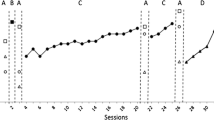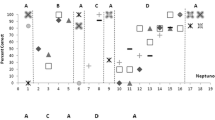Abstract
Perspective-taking, or the ability to demonstrate awareness of informational states in oneself and in others, has been of recent interest in behavioral psychology. This is, in part, a result of a modern behavioral approach to human language and cognition known as Relational Frame Theory, which views perspectivetaking as generalized operant behavior based upon a history of reinforcement for relational responding. Previous lines of research have developed a behavioral protocol for assessing relational learning deficits in perspective-taking and have implicated the lack of perspective-taking as a basis for the social deficits observed in children with autism. However, no empirical investigations have been conducted on relational learning deficits in perspective-taking with autistic populations. The present paper reports 2 experiments that investigated whether children with autism spectrum disorder demonstrated relational learning deficits in a perspective-taking task as compared to their age-matched typicalill developing peers. We also investigated whether accuracy in perspective-taking correlated with scores on standardized instruments commonly used in the assessment of autism spectrum disorder, and whether relational responding in perspective-taking improves following a history of reinforcement for such responding. Results of Experiment 1 demonstrated statistically significant differences in errors as a function of type of relation, while visual inspection revealed that partiCipants with autism spectrum disorder made more errors than typically developing children on 2 of the 3 types of relations examined. Results of Experiment 2 illustrated that a history of reinforced relational responding improved performance on the perspective-taking task.
Similar content being viewed by others
References
BARNES-HOLMES, D., HAYES, S. C., & DYMOND, S. (2001). Self and selfdirected rules. In S. C. Hayes, D. Barnes-Holmes, & B. T. Roche (Eds.), Relational frame theory: A post-Skinnerian account of human language and cognition (pp. 119–139). New York: Plenum.
BARON-COHEN, S. (1989). The autistic child’s theory of mind: A case of specific developmental delay. Journal of Child Psychology and Psychiatry, 30, 285–297.
BARON-COHEN, S. (1995). Mindblindness: An essay on autism and theory of mind. Cambridge, MA: Bradford Books, MIT Press.
BARON-COHEN, S., LESLIE, A. M. & FRITH, U. (1985). Does the autistic child have a “Theory of Mind”? Cognition, 21, 37–46.
BARON-COHEN, S., TAGER-FLUSBERG, H., & COHEN, D. (2000). Understanding other minds: Perspectives form developmental cognitive neuroscience (2nd ed.). Oxford: Oxford University Press.
DAWSON, G., & FERNALD, M. (1987). Perspective-taking ability and its relationship to the social behavior of autistic children. Journal of Autism and Developmental Disorders, 17(4), 487–498.
DIXON, J. A., & MOORE, C. F. (1990). The developmEmt of perspective taking: Understanding differences in information and weiglhing. Child Development, 61, 1502–1513.
HAYES, S. C., BARNES-HOLMES, D., & ROCHE, B. (Eds.). (2001). Relational frame theory: A post-Skinnerian account of language and cognition. New York: Plenum.
HAYES, S. C., FOX, E., GIFFORD, E. V., WILSON, K. G., BARNES-HOLMES, D., & HEALY, O. (2001). Derived relational responding as learned behavior. In S. C. Hayes, D. Barnes-Holmes, & B. T. Roche (Eds.), Relational frame theory: A post-Skinnerian account of human language and cognition (pp. 21–49). New York: Plenum.
HAYES, S. C., & QUINONES, R. M. (2005). Characterizing relational operants. Latinamerican Journal of Psychology, 3, 277–289.
HEAGLE, A., & REHFELDT, R. A. (2006). Teaching perspective-taking skills to typically developing children through derived relational responding. The Journal of Intensive Early Behavioral Intervention, 3, 8–34.
KLIN, A., VOLKMAR, F. R., & SPARROW, S. (1992). Autistic social dysfunction: Some limitations of the Theory of Mind hypothesis. Journal of Child Psychology and Psychiatry, 33, 861–876.
LEBLANC, L. A., COATES, A. M., DANESHVAR, S., CHARLOP-CHRISTY, M. H., MORRIS, C., & LANCASTER, B. M. (2003). Using video modeling and reinforcement to teach perspective-taking skills to children with autism. Journal of Applied Behavior Analysis, 36, 253–257.
MCHUGH, L., BARNES-HOLMES, Y., & BARNES-HOLMES, D. (2004). Perspective-taking as relational responding: A developmental profile. The Psychological Record, 54, 115–144.
PREMACK, D., & WOODRUFF, G. (1978). Does the chimpanzee have a ‘theory of mind’? Behavioral and Brain Sciences, 4, 515–526.
RUTTER, M., BAILEY, A., & LORD, C. (2004). SCQ: Social Communication Questionnaire. Western Psychological Services: Los Angeles, CA.
SPARROW, S., BALLA, D., & CICCHETTI, D. (1984). Vineland Adaptive Behavior Scales (Surveyed.). Circle Pines, MN: American Guidance Service.
TAYLOR, M., CARTWRIGHT, B. S., & BOWDEN, T. (1991). Perspective Taking and Theory of Mind: Do children predict interpretive diversity as a function of differences in observers’ knowledge? Child Development, 62, 1334–1351.
WIMMER, H., & PERNER, J. (1983). Beliefs about beliefs: Representation and constraining function of wrong beliefs in young children’s understanding of deception. Cognition, 13(1), 103–128.
Author information
Authors and Affiliations
Additional information
This investigation was supported by a research grant from TAP (The Illinois Autism Project, funded by Illinois Department of Human Services), awarded to Ruth Anne Rehfeldt. Portions of this paper were presented at the annual Southern Illinois University Phi Kappa Delta & Phi Kappa Phi Research Day, Carbondale, Illinois, April 2005, and at the annual meeting of the Association for Behavior Analysis, Chicago, Illinois, May 2005
Rights and permissions
About this article
Cite this article
Rehfeldt, R.A., Dillen, J.E., Ziomek, M.M. et al. Assessing Relational Learning Deficits in Perspective-Taking in Children With High-Functioning Autism Spectrum Disorder. Psychol Rec 57, 23–47 (2007). https://doi.org/10.1007/BF03395563
Published:
Issue Date:
DOI: https://doi.org/10.1007/BF03395563




